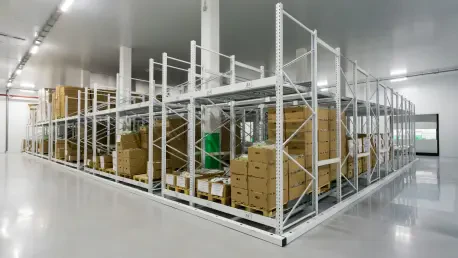The growing demand for warehousing solutions in Dubai has introduced a dynamic shift in the region’s logistics infrastructure, with Al Khayyat Investments (AKI) at the forefront of this transformative wave. The rise of near-shoring trends and the explosion of e-commerce, which require efficient logistics management, have largely driven the UAE’s warehousing industry’s expansion. These developments have set the stage for significant investments and enhancements in warehousing facilities, which have become central to supporting extensive supply chain networks.
Strategic Expansion of AKI in Dubai’s Warehousing Sector
Al Khayyat Investments, with deep roots in the UAE dating back to 1982, has been an essential player in shaping Dubai’s modern logistics landscape. Their extensive operations at Dubai Investments Park since 2008-09 lay the groundwork for their latest endeavor—a state-of-the-art 1 million square feet facility in Dubai Industrial City. This facility is already processing over half a million units daily, with scalability plans extending up to 1.5 million units. This near-tripling of capacity aims to cater to more than 30,000 business customers by offering enhanced home delivery services for AKI’s retail and e-commerce ventures, bolstering their already robust operations.
Notably, AKI has been expanding within Dubai and exploring logistics opportunities in other regions, including Saudi Arabia and Oman. This proactive geographical diversification is a strategic move designed to capitalize on high-growth markets in the Middle East. Additionally, AKI’s investment aligns with other significant ventures in the region, such as those by Abu Dhabi’s Aldar and Brookfield, emphasizing the sector’s immense potential and the critical role logistics play in modern commerce.
Integration and Connectivity Enhancements
The strategic position of AKI’s new facility near Etihad Rail’s cargo operations highlights a revolutionary turn in Dubai’s logistics approaches. Historically, warehousing proximity to airports and seaports was paramount. However, the integration with the rail network is a forward-thinking effort to boost connectivity across Dubai, Abu Dhabi, and other emirates. This transition showcases the adaptability and future-readiness of the UAE’s infrastructure, aimed at creating a seamless logistics ecosystem that can handle increasing demands and complexities.
Etihad Rail’s connectivity not only enhances intra-emirate logistics but also strengthens links with neighboring countries, potentially transforming regional trade dynamics. This infrastructure upgrade is crucial for the distributed logistics processes needed in e-commerce and other high-paced sectors. By employing newer transport strategies, Dubai is set to redefine efficient freight movement, reduce dependency on traditional supply chain routes, and cater to the growing need for rapid and reliable deliveries.
Embracing the Third-Party Logistics (3PL) Boom
AKI’s expansion strategy is also significantly marked by a burgeoning third-party logistics business, buoyed by significant contracts, including one from a Dubai Government entity. The flexibility and efficiency offered by 3PL services have made them indispensable in today’s logistics and warehousing landscape. This shift towards 3PL solutions has been mainly driven by the scalability, cost-effectiveness, and expertise they offer—crucial aspects for companies looking to maintain agility and competitiveness.
For AKI, the decision to enhance its 3PL capacities signifies an understanding of market demands and a commitment to meeting those efficiently. It reflects the company’s strategic insight into the growing necessity for more scalable and responsive logistics solutions in the fast-paced e-commerce world. This move not only strengthens its service portfolio but also positions AKI as a vital partner for global businesses looking to optimize their logistics operations within Dubai and beyond.
Future Prospects and Industry Trends
Looking ahead, the warehousing and logistics markets in Dubai appear poised for continued growth and sophistication. The near-shoring trend, instigated by the Covid-19 pandemic to mitigate supply chain disruptions, is likely to sustain given its role in fostering local production and reduced dependency on distant suppliers. The e-commerce sector, which experienced unprecedented growth during the pandemic, continues to push the envelope for more efficient and expansive warehousing solutions. Investments by significant entities underscore the vast potential and essential nature of this sector in supporting broader economic activities.
Al Khayyat Investments’ proactive approach and substantial investments highlight their pivotal role in shaping Dubai’s warehousing boom. From advanced facility setups to groundbreaking integration with rail networks and robust 3PL services, AKI’s strategies reveal a keen understanding of contemporary logistics needs. As they continue to expand within the UAE and explore new markets, their trajectory is expected to serve as a blueprint for other players in the industry, encouraging further innovation and efficiency in the logistics and warehousing realm.
Conclusion: Embracing Future Logistics Dynamics
The rising need for warehousing solutions in Dubai has triggered a dynamic transformation in the region’s logistics landscape, with Al Khayyat Investments (AKI) leading this revolutionary shift. The UAE’s warehousing industry’s growth has been primarily fueled by the surge in near-shoring trends and the rapid boom of e-commerce, which necessitate proficient logistics management. These factors together have paved the way for substantial investments and upgrades in warehousing infrastructure, positioning these facilities as pivotal elements in bolstering extensive supply chain networks.
As businesses increasingly prioritize efficient storage and distribution capabilities to keep pace with consumer demands, the importance of advanced warehousing solutions cannot be overstated. AKI’s role in this evolution highlights the company’s commitment to innovation and excellence. It is crucial for regions like Dubai, with its strategic location and booming economic sector, to stay ahead in logistics and warehousing to support the continuous growth and seamless operation of supply chains.









